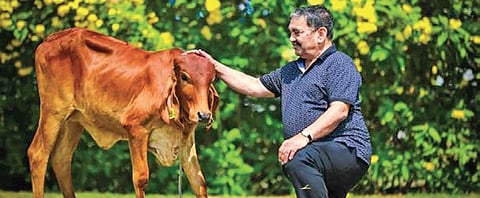

BENGALURU: A private firm involved in bovine genetics and multiple cattle reproduction has achieved a whopping 56 pregnancies from the eggs of a single cow of the Gir breed. All the calves are expected to be born between January and June this year.“This is a significant development considering that normally, a single cow cannot give birth to more than eight to ten calves in its lifetime. Here, we have ensured 56 cows being pregnant with embryos developed by fertilising eggs from a single cow in just six months,” Dr Shyam Zawar, Chief Scientist and Chief Executive Officer of JK BovaGenix told The New Indian Express. The company comes under the JK Trust, promoted by Raymond.
An earlier similar experiment by Zawar’s team, carried out on another Gir cow named Radha, yielded 14 calves in a year.The record initiative, claimed to be a first in India, is said to be in line with the objectives of Union Government’s Rashtriya Gokul Mission, which aims at preserving and propagating indigenous cattle breeds like Gir (Gujarat), Sahiwal (Punjab/Haryana), Tharparkar (Rajasthan), Ongole and Punganur (Andhra Pradesh) and Khillar (Maharashtra).
However, the main objective of multiple breeding using the technique of ‘test-tube calves’ is to boost volumes and quality of milk. Multiple pregnancies in high-yield milk cattle means more cows lactating and yielding higher volumes of better quality milk, explained Dr Zawar.He said the latest feat in multiple cattle reproduction was that from a Gir cow named Gauri. Scientists of JK BovaGenix extracted oocytes (eggs) from Gauri, which were fertilised in a test tube (in-vitro) with sperms of a healthy pedigree bull of the same breed. The process of fertilisation was carried out in test-tubes during which the temperatures and nourishment required for the growth of the embryos were simulated so that none of the eggs perished during the process, he pointed out.
When the embryos were just seven days old, they were implanted in the uteruses of 56 healthy cows – 38 at the JK Trust farm laboratory in Shirur taluk, 70 Km from Pune, Maharashtra, while the rest 18 were at private cattle farms across India. The JK Trust is working on these techniques in 35,000 villages spread across 12 states. All these cows are now pregnant and are scheduled to deliver calves anytime between this month and June. Each IVF-induced pregnancy cost Rs 25-30,000, he said.
Zawar said their animal reproduction experiments involved three categories pertaining to artificial reproductive techniques — artificial insemination, embryo transfer and IVF, the last being the most advanced.“We are also training teenagers who have passed Class 12 to carry out artificial insemination, and have so far trained 10,000 boys with another 4,000 currently under training. Once trained, they are able to earn up to Rs 10,000 a month. Apart from the boys, we have also trained 140 women in the technique, which adds to their incomes,” Dr Zawar said.